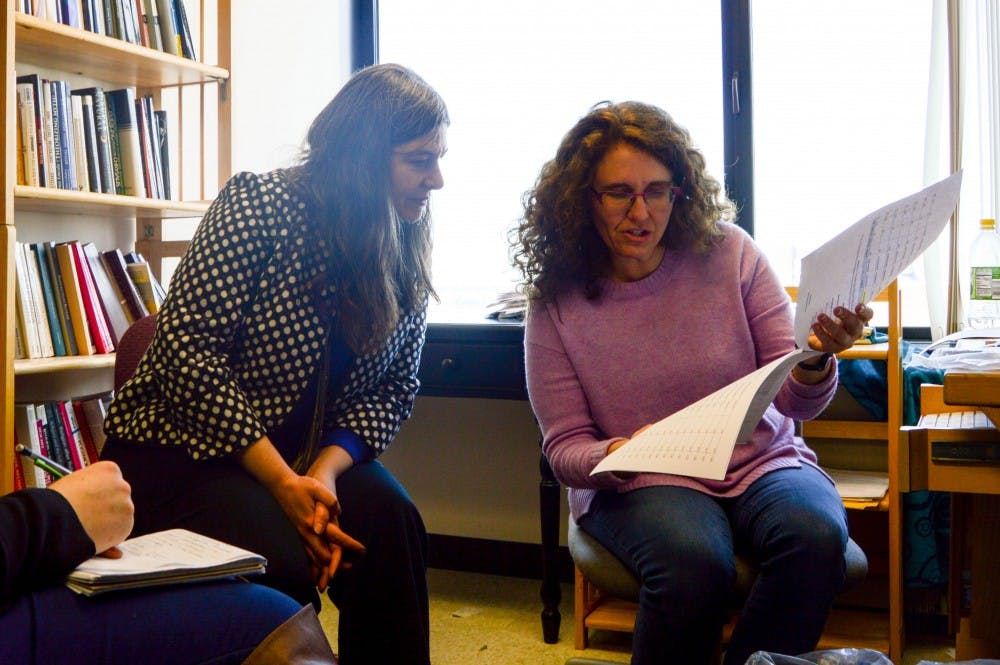After being folded into the Transnational Studies Department for 10 years, Global Gender and Sexuality Studies is once again a standalone program.
Faculty Senate reinstated the Global Gender and Sexuality Studies Department’s independent status after a unanimous vote at the senate’s first meeting on Feb. 20.
Global Gender and Sexuality Studies became a part of the Transnational Studies Department in 2008 as a cost-saving measure, according to Gwynn Thomas, a professor in the Global Gender and Sexuality Studies Department.
UB’s Global Gender and Sexuality Studies Department, originally established as a result of student activism in the 1960s, was one of the first in the nation. The department boasted an “innovative curriculum” that “brought women into the picture,” according to Thomas.
UB Gender Institute Director Carrie Bramen said the reinstatement of Global Gender and Sexuality Studies as a standalone department is “long overdue.”
“Given that UB’s department was one of the first women’s studies programs and was really at the forefront nationally, its great to see it revitalized,” Bramen said.
The framework of Transnational Studies did not work well for Global Gender Studies, Thomas said, because it made it difficult for students to find the program and made the work of well-known gender studies scholars such as Susan Kahn less visible. She said being an independent department also lends itself more easily to interdisciplinary research.
In 2016, the Global Gender Studies faculty started meeting to discuss the future of the program, and they determined that the program needed its own department structure.
“Being part of Transnational Studies basically became an institutional barrier to us flourishing and a barrier to the recognition of the depth of scholarship in women’s and gender studies,” Thomas said.
UB was the only graduate department among peer universities that didn’t have a standalone department, Thomas added.
“So we were basically totally out of step with the basic way women and gender studies is found in other universities,” Thomas said.
Thomas said becoming a standalone department will provide more academic opportunities for students interested in women and gender studies, sexuality studies and feminism. It will also enable the department to hire more tenured faculty. Thomas said hiring more diverse faculty is a priority as the department moves forward.
“You cannot have a conversation about gender without also discussing things like race, class and homophobia because all of those things are connected,” she said. “And this would provide us a way of really making those arguments.”
Thomas also discussed why UB’s gender studies department is called “global” gender and sexuality studies.
“One of the things that marked UB’s innovation in the ‘90s and 2000s was we always had faculty involved in the process of thinking more globally and not centering the U.S.,” Thomas said. “If we’re analyzing gender, this is a concept that doesn’t just apply to the U.S., and a global focus has always been important to UB’s department, so it made sense to include that in the name.”
Laura Aguilera, a senior global gender and sexuality studies and international studies major, is not as enthusiastic about the department’s move to standalone status. She is concerned that the shift will cause the program to become less diverse and global in scope.
“I liked being related to African American Studies and American Studies under transnational studies,” she said. “I don’t want Global Gender Studies to turn into a focus on Western white feminism.”
The newly independent department is now called global Gender and Sexuality Studies, which Thomas said reflects the faculty’s commitment to including sexuality studies in the curriculum. While the new name does not represent a change in coursework, the department hopes to add more courses in sexuality studies and eventually a certificate in sexuality studies to reflect the program’s “new strengths,” Thomas said.
“Gender doesn’t just include the differences between men and women or masculinity and femininity, but also how gender is constructed through issues of race, class and sexuality,” Thomas explained.
Anne Marie Butler, a Ph.D. student in global gender and sexuality studies, feels like she is more “legitimized” now that UB has a specific, standalone gender studies department.
“So when I go on the job market, I’m going to have a degree that specifically says global gender and sexuality studies, so I feel like it’s really helping me,” Butler said.
She hopes the move to a standalone department will help to highlight diverse and “under-heard, underrepresented and erased” voices in academia.
Thomas is excited for the future of the department, and hopes its standalone status will emphasize the importance of gender studies, particularly for students interested in social justice and making a difference in society.
“If you want to understand how inequality has been constructed in our society, how power has been constructed in our society, how our institutions reflect those ideas, ... you can’t even engage in those questions if you don’t have a really good understanding of the role of gender in those constructions,” Thomas said
Marla Segol, a professor in the Global Gender and Sexuality Studies Department, is excited about the future of the newly reestablished department.
“We are so excited to have autonomy and to have the opportunity to develop and grow,” Segol said. “There’s so much interest in gender studies, especially at this current moment in our national discourse. So we’re really excited to build a department that is timely and is of major concern to our students and to us, but will also build a platform for conversation and dialogue.”
Maddy Fowler is the editorial editor and can be reached ay maddy.fowler@ubspectrum.com@mmfowler13.





